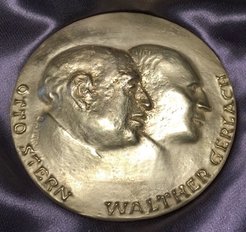Stern-Gerlach Medal 2018 for Karsten Danzmann
The Max Planck director and professor at Leibniz Universität Hannover receives the German Physical Society’s most prestigious award for experimental physics
Prof. Karsten Danzmann, director at the Max Planck Institute for Gravitational Physics (Albert Einstein Institute; AEI) in Hannover and director of the Institut für Gravitationsphysik of Leibniz Universität Hannover, will be awarded the Stern-Gerlach Medal of the German Physical Society (Deutsche Physikalische Gesellschaft; DPG). He will receive the golden medal and a hand-written certificate on parchment in a Festakt on 7th March 2018 during the 82nd annual DPG meeting in Erlangen. The Stern-Gerlach Medal is the DPG’s most prestigious award for experimental physics. Danzmann receives the medal for his crucial contributions to the development of gravitational-wave detectors.

The choice of Danzmann for the 2018 Stern-Gerlach Medal was announced in a press release by the DPG today. Danzmann’s research enabled the first direct detection of gravitational waves and thereby ushered in a new era of astrophysics, the DPG writes.
“I am absolutely delighted about this award from the German Physical Society. The Stern-Gerlach Medal as the most prestigious German prize for experimental physics is something quite unique,” says Karsten Danzmann. “In my eyes the medal also honors the efforts of all those who tirelessly worked together with me over the past 30 years on the instruments that now for the very first time enable gravitational-wave astronomy.”
Technology development at GEO600
As part of the GEO Collaboration, a team of Max Planck, Leibniz Universität Hannover and UK researchers, Danzmann has been operating the GEO600 gravitational-wave detector south of Hannover, Germany, since the mid 1990s. GEO600 is a development center for novel and advanced technologies in the international gravitational-wave research community.
Many key technologies that enable the unprecedented sensitivity of LIGO and its discoveries have been developed and tested by GEO600. AEI researchers together with the Laser Zentrum Hannover e.V. also developed, built, and installed the high-power laser systems at the heart of the LIGO instruments. Crucial improvements in the optical measurement principle such as simultaneous power and signal recycling where first demonstrated in GEO600 as a large gravitational-wave detector.
Paving the way for the future of gravitational-wave astronomy
GEO600 is the only gravitational-wave detector worldwide using “squeezed light” to mitigate fundamental quantum noise effects and improve its sensitivity at high frequencies. In the future all ground-based gravitational-wave detectors will use squeezed-light sources similar to that at GEO600 to further improve their sensitivity.
Detecting gravitational waves in space with LISA
Since the early 1990s Danzmann also has been playing a leading research role in a gravitational-wave detector called LISA (Laser Interferometer Space Antenna), which will be launched as a mission of the European Space Agency ESA in 2034. Three satellites will span an equilateral triangle of laser arms, each 2.5 million kilometers long, and will detect low-frequency gravitational waves entirely inaccessible on Earth. Together with an international team, Danzmann showed in 2016 that the technology required for LISA works. ESA has selected LISA as the L3 mission in its Cosmic Vision Programme.
Awards for a leading scientist
Karsten Danzmann has been presented with the Fritz Behrens Foundation Science Prize 2016, the Lower Saxony Science Award 2016, the Körber European Science Prize 2017, and the Otto Hahn Prize 2017. Together with Bruce Allen, director at the AEI Hannover and Alessandra Buonanno, director at the AEI Potsdam, he received the Lower Saxony State Prize 2016. As a member of the LIGO Scientific Collaboration he was awarded the Special Breakthrough Prize in Fundamental Physics, the Gruber Cosmology Prize, and the Princess of Asturias Award.
Stern-Gerlach Medal

The Stern-Gerlach Medal is the DPG’s most prestigious award for outstanding achievements in the field of experimental physics. Since 1993 is has been awarded annually for single or several publications from all fields of physics. The Stern-Gerlach Medal is comprised of a hand-written certificate on parchment and a golden medal that shows the portraits of Otto Stern and Walther Gerlach. The medal was created in 1993 as an upgrade of the Stern-Gerlach Prize awarded by the DPG from 1988 to 1992.













